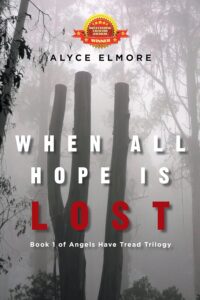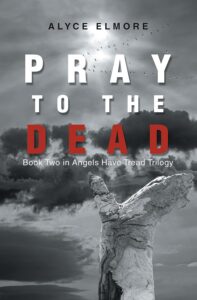
When All Hope is Lost
(Book 01 of Angels Have Tread Series)
Buy Now
The women of 2029 faced a terrible crisis when a pandemic killed all adult males, but they survived and now, twenty years later, they are once again starting to thrive. The problem is that the disease continues to kill males as they reach maturity and there's no cure in sight. Having adapted to a world that is no longer dependent on men, is it time to change history to her story?

Pray to the Dead
(Book 02 of Angels Have Tread Series)
Buy Now
Twenty years ago The Desolation wiped out all males over the age of twenty and despite the best efforts of researchers no cure has been found. Women have recovered and adapted to this new world but what should they do about the 'male problem'? With the reintroduction of democratic elections looming, this is their most pressing issue. Should males be eliminated, exploited as cheap disposable workers or allowed to live short but useful lives? And what secret is so damning that the government will go to any lengths to cover it up?

For Where There Are Harps
(Book 03 of Angels Have Tread Series)
Buy Now
The story recounts the events that occurred 20 years after the Desolation that killed all adult males and changed the male genome so boys die by the age of 20.. The Greater Republic of Melbourne survived the difficult Transition years thanks to the benevolent dictator Evelyn Perkins but now it's time to hold elections. The major issue for most women is what to do about males. Break throughs in artificial insemination make males superfluous for reproduction so aside from using them as cheap labour, what value do they provide?

Angels Have Tread
(Book 04 of Angels Have Tread Series)
Coming in 2026
This is the final installment of the Angel Have Tread sereis by Alyce Elmore. After When All Hope is Lost, Pray to the Dead and For Where There are Harps, Alyce brings you a finale to the series in a way that will blow your mind.
The book is scheduled to be released in 2026.
The book is scheduled to be released in 2026.
Reviews
When All Hope is Lost
Alyce Elmore’s dystopian suspense novel, When All Hope is Lost, follows the political and social shifts that emerge in a female-dominated society after a widespread catastrophe.
The year 2029 marks the onset of a devastating global pandemic that annihilates the world’s male population within three years. Following the desolation, subsequent male generations don’t survive either; just before reaching their 20th birthdays, they exhibit erratic, dangerous behavior and soon collapse and die. By 2050, women have adjusted to a world devoid of adult males. Many in Australian society now view males as burdens; hence, their rights are restricted.
The story is structured as a 2069 interview conducted by a young, University of Melbourne student as an admissions requirement to its master’s program. The interviewee is an elderly person dubbed the “Old One,” who recounts the events surrounding the pandemic and successive political changes. Frustratingly, the interviewee constantly shifts her focus from one character to another, interrupting the story’s flow.
The novel also features various intriguing characters who try to navigate the post-pandemic era, including friends Karen, Josh, Benny and Zane who are forced onto different paths after the devastation; a political reporter trying to solve several interrelated mysteries; a researcher looking for a cure for the male malady, and key fictional political figures.
Meanwhile, there’s the suspicious death of the Greater Melbourne Republic’s premier; characters determined to fight Australia’s rising fascism and to champion the rights of males; and other intrigue.
Exploring themes regarding political autocracy, equality and human rights, this novel is a thought-provoking read. Its rich descriptions of its social and political settings and its fresh, relatable characters determined to stand up for freedom make it absorbing, as does the tension that builds throughout.
While the Old One’s disjointed storytelling causes reading challenges, science fiction fans will appreciate the story’s original concept, absorbing scenes and engrossing subplots.
Also available in hardcover and ebook.
The year 2029 marks the onset of a devastating global pandemic that annihilates the world’s male population within three years. Following the desolation, subsequent male generations don’t survive either; just before reaching their 20th birthdays, they exhibit erratic, dangerous behavior and soon collapse and die. By 2050, women have adjusted to a world devoid of adult males. Many in Australian society now view males as burdens; hence, their rights are restricted.
The story is structured as a 2069 interview conducted by a young, University of Melbourne student as an admissions requirement to its master’s program. The interviewee is an elderly person dubbed the “Old One,” who recounts the events surrounding the pandemic and successive political changes. Frustratingly, the interviewee constantly shifts her focus from one character to another, interrupting the story’s flow.
The novel also features various intriguing characters who try to navigate the post-pandemic era, including friends Karen, Josh, Benny and Zane who are forced onto different paths after the devastation; a political reporter trying to solve several interrelated mysteries; a researcher looking for a cure for the male malady, and key fictional political figures.
Meanwhile, there’s the suspicious death of the Greater Melbourne Republic’s premier; characters determined to fight Australia’s rising fascism and to champion the rights of males; and other intrigue.
Exploring themes regarding political autocracy, equality and human rights, this novel is a thought-provoking read. Its rich descriptions of its social and political settings and its fresh, relatable characters determined to stand up for freedom make it absorbing, as does the tension that builds throughout.
While the Old One’s disjointed storytelling causes reading challenges, science fiction fans will appreciate the story’s original concept, absorbing scenes and engrossing subplots.
Also available in hardcover and ebook.

When I first came across the premise of When All Hope is Lost, I must say, I was intrigued, albeit skeptical. After all, I reasoned, the old gender switcharoo has been done to death, especially in recent years, with the progression of egalitarian values in the world.
What I thoroughly enjoyed about this first book in the The Angels Have Tread trilogy was that the author managed to take this somewhat overused idea of women ruling the world, whilst men are reduced to playthings, servants, and of course, breeding apparel, and make it worth reading. That, in itself, is no easy feat. Because if you think about it, every story has been told before, in its more bare form, at least. So to be able to adapt and shape that skeleton of a story, and still make it interesting - now, that's saying something.
I also enjoyed the web of character that Elmore weaves, particularly the complex relationship between Monika and Evelyn. Far more than a mere mentor-apprentice duo, these two ladies enjoy this wonderfully rich and emotional chemistry. Personally, the chapters featuring these two were my favorites, by quite a margin. Zane and Karen probably would've come in second, as far as the characters go.
Speaking of character interactions, though, there was one element of the story that, for me, really brought the whole experience down. Much as I enjoyed the Old One, as a character, her little introductory exchanges at the beginning of each chapter just got on my nerves and stilted the story (I thought). While I think a little introduction would've been nice at key points in the story, the Old One's exaggeratedly suspenseful remarks, along the lines of the knowing "you'll see" were just too much. They made keeping up with the story's progression more difficult - so why do that?
In my opinion, the book, at 120k words, was overly long for what it had to offer. I feel that if the author would've compressed the action into a neat 90k words, then the story would've been much smoother, and more fast-paced.
All of that being said, I thought the final chapter was well-written, and among the strongest in the entire novel. For that, and for the other good aspects I pointed out, I might like to read the second book in the series. But I strongly suggest that you make up your own mind, since books are subjective, and what resonates with you might not resonate with me. And vice-versa.
What I thoroughly enjoyed about this first book in the The Angels Have Tread trilogy was that the author managed to take this somewhat overused idea of women ruling the world, whilst men are reduced to playthings, servants, and of course, breeding apparel, and make it worth reading. That, in itself, is no easy feat. Because if you think about it, every story has been told before, in its more bare form, at least. So to be able to adapt and shape that skeleton of a story, and still make it interesting - now, that's saying something.
I also enjoyed the web of character that Elmore weaves, particularly the complex relationship between Monika and Evelyn. Far more than a mere mentor-apprentice duo, these two ladies enjoy this wonderfully rich and emotional chemistry. Personally, the chapters featuring these two were my favorites, by quite a margin. Zane and Karen probably would've come in second, as far as the characters go.
Speaking of character interactions, though, there was one element of the story that, for me, really brought the whole experience down. Much as I enjoyed the Old One, as a character, her little introductory exchanges at the beginning of each chapter just got on my nerves and stilted the story (I thought). While I think a little introduction would've been nice at key points in the story, the Old One's exaggeratedly suspenseful remarks, along the lines of the knowing "you'll see" were just too much. They made keeping up with the story's progression more difficult - so why do that?
In my opinion, the book, at 120k words, was overly long for what it had to offer. I feel that if the author would've compressed the action into a neat 90k words, then the story would've been much smoother, and more fast-paced.
All of that being said, I thought the final chapter was well-written, and among the strongest in the entire novel. For that, and for the other good aspects I pointed out, I might like to read the second book in the series. But I strongly suggest that you make up your own mind, since books are subjective, and what resonates with you might not resonate with me. And vice-versa.
Pray to the Dead
Alyce Elmore’s suspense-filled second installment of her Angels Have Tread Trilogy chronicles events leading up to political upheaval in female-ruled Australia following a cataclysmic global pandemic that destroys all adult males.
In the year 2029, a devastating global pandemic began that annihilated the world’s adult male population within three years. Subsequent male generations exhibit erratic, dangerous behavior and soon collapse and die before reaching their 20th birthdays.
In this volume, through the leadership of Melbourne’s formidable political figure, Evelyn Perkins, women have adjusted to a world without men. However, the successive effects of the pandemic are still raging. Mothers of boys are shunned by society. The possibility of a cure for males could also overturn the current female-run political and economic system.
As the first democratic election in 20 years draws closer, key political figures struggle to outwit each other. The government is also concealing information that could undo the current political system if discovered. Meanwhile, Evelyn has become a polarizing force, viewed by many as a revered leader—but by others as a dictator. Male rights protestors are surveilled and harassed. The book's depiction of the political situation in Australia is compelling and realistic. High-level politicians are less concerned about transparency and truth and more interested in maintaining their power.
The story moves at a brisk pace and tension is maintained throughout. Despite the book's fast pace, absorbing descriptions of the challenges each character faces keep readers invested in them.
However, since the book is part of a trilogy, significant questions relating to the main political conflict and the main characters’ fates are left unanswered. The transitions between different sub-plots are also abrupt, and more context is needed at the beginning of the book to help readers new to the trilogy acclimate.
Nonetheless, Pray to the Dead is an intriguing read. It will appeal to fans of political thrillers for its captivating twists, fresh storylines and compelling cast of characters.
Also available in hardcover and ebook.
In the year 2029, a devastating global pandemic began that annihilated the world’s adult male population within three years. Subsequent male generations exhibit erratic, dangerous behavior and soon collapse and die before reaching their 20th birthdays.
In this volume, through the leadership of Melbourne’s formidable political figure, Evelyn Perkins, women have adjusted to a world without men. However, the successive effects of the pandemic are still raging. Mothers of boys are shunned by society. The possibility of a cure for males could also overturn the current female-run political and economic system.
As the first democratic election in 20 years draws closer, key political figures struggle to outwit each other. The government is also concealing information that could undo the current political system if discovered. Meanwhile, Evelyn has become a polarizing force, viewed by many as a revered leader—but by others as a dictator. Male rights protestors are surveilled and harassed. The book's depiction of the political situation in Australia is compelling and realistic. High-level politicians are less concerned about transparency and truth and more interested in maintaining their power.
The story moves at a brisk pace and tension is maintained throughout. Despite the book's fast pace, absorbing descriptions of the challenges each character faces keep readers invested in them.
However, since the book is part of a trilogy, significant questions relating to the main political conflict and the main characters’ fates are left unanswered. The transitions between different sub-plots are also abrupt, and more context is needed at the beginning of the book to help readers new to the trilogy acclimate.
Nonetheless, Pray to the Dead is an intriguing read. It will appeal to fans of political thrillers for its captivating twists, fresh storylines and compelling cast of characters.
Also available in hardcover and ebook.

Pray To The Dead, the second book in Alyce Elmore’s Angels Have Tread Trilogy, follows the lives of several individuals and the new world they encounter 20 years after the desolation exterminated all males over the age of 20. Catherine is pleased to be the rising star of the New Order Party and looks forward to a new society with no use for males. Sofia, a council moderator in the Warragul colony, believes the government, or someone in the government, is responsible for the murders of the boys she is investigating. Finally, Patricia, a political journalist, discovers that the government is concealing some research from the public and is perplexed about what it all means. Is there a diabolical scheme being carried out by the government against males?
The gripping book features an impressive and well-developed world. The glossary of terms at the beginning of the book contains several words that reflect the changes in the new world. For example, the latter years of a young man’s life are referred to as cusp, and male sex workers are referred to as studs. Furthermore, viewing the physical features via the perspective characters’ thoughts makes envisioning the scenes a delight. The book contains profound insights, such as when Patricia characterizes an interior design as nice enough but lacking in personality. Another excellent quality of the novel is how unpredictable it is; the twists and turns have you eagerly anticipating the next chapter.
Pray To The Dead is a thought-provoking and riveting novel that will have sci-fi and fantasy readers unable to put the book down. I applaud author Alyce Elmore for writing such a brilliant story that inspired me to envisage a world where males play minimal societal roles through a riveting chain of events. Readers who appreciate dystopian and political novels with multiple intricate turns will enjoy this book.
The gripping book features an impressive and well-developed world. The glossary of terms at the beginning of the book contains several words that reflect the changes in the new world. For example, the latter years of a young man’s life are referred to as cusp, and male sex workers are referred to as studs. Furthermore, viewing the physical features via the perspective characters’ thoughts makes envisioning the scenes a delight. The book contains profound insights, such as when Patricia characterizes an interior design as nice enough but lacking in personality. Another excellent quality of the novel is how unpredictable it is; the twists and turns have you eagerly anticipating the next chapter.
Pray To The Dead is a thought-provoking and riveting novel that will have sci-fi and fantasy readers unable to put the book down. I applaud author Alyce Elmore for writing such a brilliant story that inspired me to envisage a world where males play minimal societal roles through a riveting chain of events. Readers who appreciate dystopian and political novels with multiple intricate turns will enjoy this book.
